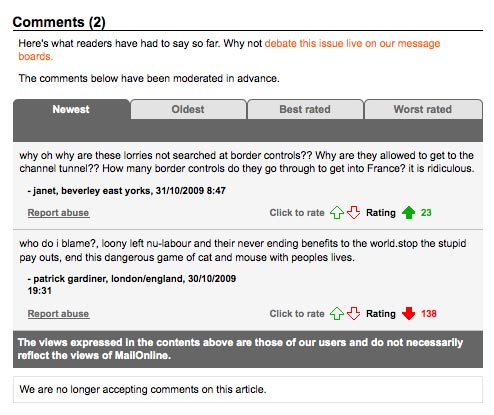This is a cross-post from Malcolm Coles’ website www.malcolmcoles.co.uk.
Update: There are suggestions on a Guardian story that the Sun moderators haven’t been putting through comments that are critical of the Sun’s position …

Is the Sun censoring pro-Brown comments?
Original post
The Sun is running a campaign against Gordon Brown. But I’ve analysed the comments on its website – and readers disagree with its stance by a ratio of more than 3 to 2.

Gordon Brown letter story in the Sun
The paper has exploited the grief of Jacqui Janes over her son Jamie’s death in Afghanistan to attack the PM – because his handwritten letter of condolence was supposedly disrespectful due to sloppy writing and (disputed) spelling errors.
It’s loathsome journalism that ignores the effect of his disability (the PM is blind in one eye).
And it seems Sun readers are mostly on the Prime Minister’s side.
Of the 100+ comments on the story (don’t worry, I’ve nofollowed those links) when I checked, 111 expressed a view for or against Jacqui Janes or Gordon Brown (the rest commented on other issues or corrected people’s spelling errors). Of these:
- 42 were anti Gordon or pro the Sun’s stance.
- 69 were pro Gordon or anti the Sun’s stance.
So that’s more than 60 per cent who don’t agree with the Sun, and less than 40 per cent who do.
Sample comments from those who agree with the Sun’s stance:

Comments agreeing that Gordon Brown is “discusting”
Some comments from those opposing it:

Comments defending Gordon Brown
Conclusion
The Sun is channeling this woman’s grief into a personal attack on the Prime Minister.
It’s refusing to make allowances for his disability (maybe we could next attack the war wounded for being workshy benefit scroungers?).
And it’s facilitating her breaking data protection laws by releasing a recording of a private phone call.
The whole thing is sickening – let’s hope that observing its readers’ reactions will lead to an end to this (not that this happened in the Jan Moir case) – and preferably prosecution of the Sun over the data protection offence.




